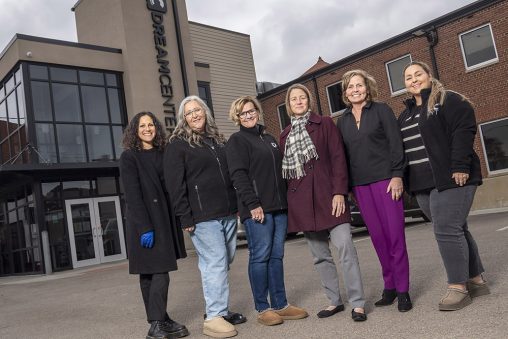 Wright State University is set to start a mobile health clinic in downtown Dayton, run by staff and students of the Boonshoft School of Medicine.
Wright State University is set to start a mobile health clinic in downtown Dayton, run by staff and students of the Boonshoft School of Medicine.
Once a week, a Premier Health mobile unit will park outside of the Dream Center, a nonprofit outreach center that offers support and resources to those affected by poverty, addiction, abuse, joblessness and educational opportunity gaps.
The program will focus on helping individuals who are unhoused, or precariously housed, said Anna Squibb, director of the addiction medicine fellowship at Wright State and of substance use and addiction services at Premier Health. The street medicine model limits barriers to accessing care, like transportation or insurance.
“The real benefit here is recognizing where individuals are and truly meeting them where they are, and providing those basic health services right now, regardless of their ability to to show up at a location this specific time with an active insurance card,” Squibb said. “As we start to rebuild health and rebuild lives with our partnerships in the community, then hopefully these individuals are able to access the more traditional health system.”
The program is funded by a two-year OneOhio Recovery Foundation grant of around $300,000. The foundation was created to distribute 55% of the funds Ohio is set to receive from the settlements paid by the pharmaceutical industry for its role in the national opioid epidemic.
“Everyone deserves to have the health issues that are really nagging at them treated with care and empathy and dignity,” said Sydney Silverstein, professor in the Center for Interventions, Treatment and Addictions Research.
Primary care services will promote positive lifestyle changes and address existing health concerns: harm reduction that can also help prevent substance use from turning into addiction.
“We kind of de-center the drugs and just think about asking people, what in your life is causing you harm and are there ways in which we can help support you in mitigating some of that harm?” Silverstein said. “Whether that’s related to drugs or whether it’s related to mental health struggles or struggles with diet or eating or lifestyle or housing.”
She has started on the groundwork, spending time at the Dream Center engaging with community members using its services, like laundry, showers, clothing, and food pantry.
“I’m going to be at the Dream Center until we have the mobile unit up and running, talking to the people who access services, trying to get a better idea of what are the needs of this population,” Silverstein said.
They estimate the mobile health unit will start offering services in the spring.
Around 50 Wright State medical and behavioral health students will participate in street medicine training and outreach.
“It’s an important opportunity for the students to get out of a traditional hospital setting and learn a little bit more about the holistic piece of people’s lives,” Silverstein said. “Then also learn how to provide more trauma-informed care in the context of a mobile health unit.”
Silverstein said the students she works with seem motivated to better the healthcare system.
“Challenging experiences in hospitals and other clinical settings haunt a lot of people,” Silverstein said. “Working with medical students, a lot of them seem really motivated at being a different kind of physician.”

 Wright State to expand nursing facilities to meet workforce needs and prepare more graduates for in-demand careers
Wright State to expand nursing facilities to meet workforce needs and prepare more graduates for in-demand careers  Wright State student-athletes make a lasting impact on local family with more to come
Wright State student-athletes make a lasting impact on local family with more to come  Wright State names Rajneesh Suri dean of Raj Soin College of Business
Wright State names Rajneesh Suri dean of Raj Soin College of Business  ‘Only in New York,’ born at Wright State
‘Only in New York,’ born at Wright State  Wright State president, Horizon League leaders welcome new commissioner
Wright State president, Horizon League leaders welcome new commissioner 